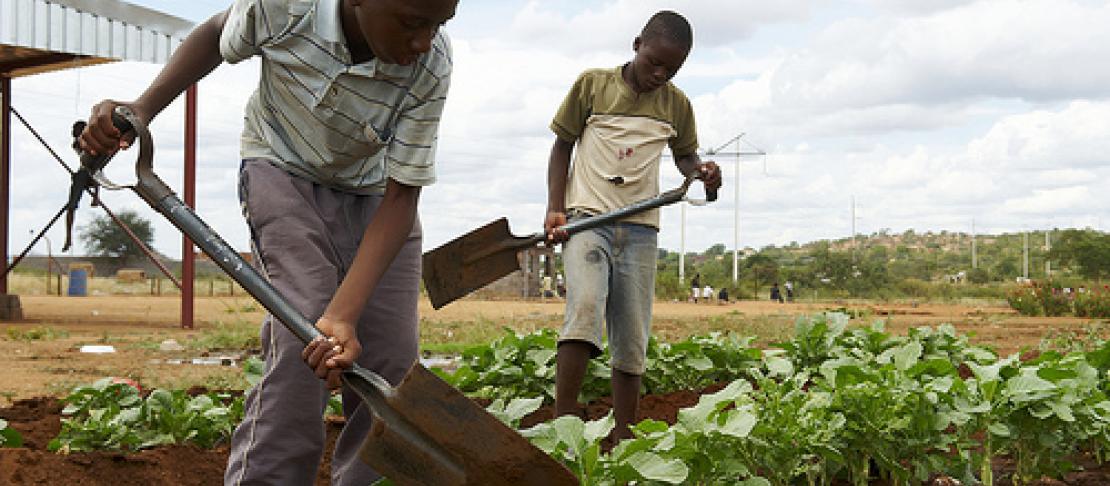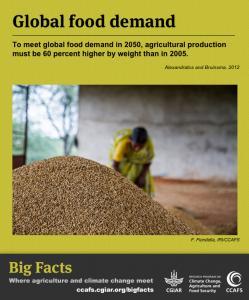Global hunger and undernutrition could be worsened by climate change

Co-written by Irish Deputy Prime Minister Eamon Gilmore; Mary Robinson, president of the Mary Robinson Foundation Climate Justice; Ertharin Cousin, executive director of the World Food Programme; and Frank Rijsberman, CEO, CGIAR Consortium.
Join the discussion on Twitter: #HNCJ
"Imagine a world where too much rain, or too little, means the difference between a life fulfilled and a life blighted by hunger and poor nutrition. Imagine, for a brief moment, measuring your children’s chance of survival by the number of bags of grain you harvest or against a dwindling stock of rice.
This is the reality for millions of vulnerable communities. Today, almost one billion people suffer from hunger, most of them women and children. Globally, almost one in three children grows up lacking the nutrients they need to fend off disease and to develop to their full potential.
And now, climate change is exacerbating the hardships they face daily.
The links between climate, hunger and poor nutrition are becoming increasingly clear: a recent report for the Committee on World Food Security warned that climate change could significantly change the amount and quality of food consumed – with potentially devastating consequences for those most at risk of hunger.
The report also cautioned that climate change may hinder people’s capacity to earn a living and provide proper nutrition for themselves and their families.
In many parts of the world, four out of five people depend on farming to survive. These traditional farmers, many of them women, live in regions where they are perilously exposed to the tiniest shifts in weather patterns.
Over generations, they have learnt to nurture crops to harvest in the most forbidding of circumstances. However, now that climate change is increasing the frequency and severity of droughts and floods, their livelihoods are at risk, making it harder to produce sustainable crops, farm livestock or forge a living from fishing.
Now let’s look ahead to 2050: with the world’s population set to reach 9 billion, we will need to increase agricultural production by almost 60 per cent just to ensure everyone is fed. But over the intervening years, climate change, water scarcity and land degradation could reduce food production by a quarter, pushing millions more people into poverty.
Our shared challenge is not just to produce enough food: we must also ensure that it is nutritious. Otherwise we risk perpetuating the vicious cycle where children grow up without the nutrients critical to their physical and mental development.
Tragically, research has shown us that the damage caused by a lack of proper nutrition in the first two years of a child’s life can never be undone.
So which legacy will we pass to our children? A world where millions more families live in hunger or one in which every child receives enough of the right food to thrive?
If it is the latter, we must move away from a business-as-usual approach to development to a more people-centred one. We must focus on the most vulnerable and seek to protect their rights. This is consistent with a climate justice approach.
In April, the Government of Ireland and the Mary Robinson Foundation Climate Justice are hosting an international conference to stimulate debate on these linked challenges, and to inspire innovative thinking and solutions.
The conference - 'Hunger, Nutrition, Climate Justice 2013' - is being organised in partnership with the World Food Programme and the CGIAR Research Program on Climate Change, Agriculture and Food Security (CCAFS).
Our global challenge is to determine how we can assist those who are most at risk: not by imposing solutions from above, but by coupling farmers’ traditional knowledge, practice and expertise with scientific innovations to reduce hunger, improve nutrition and help them adapt to climate change.
Almost 100 smallholder farmers and vulnerable people living on the frontline of climate change will attend the Dublin conference in April.
They will share their experiences of growing food in a world impacted by climate change and present the solutions they are pioneering in their fields. The voices of women in particular will be amplified as they are primarily responsible for both farming and feeding their families in many parts of the world.
The conference will bring together these local people and practitioners who are facing the realities of rising food prices, failed crops and under-nutrition and global leaders, policy makers and scientists.
We want to ensure that our future policy approaches are firmly rooted in the reality of lives and in objective evidence of what has worked and what has not.
This conference comes at a critical point in international development. This year, the international community will review progress on the Millennium Development Goals, two years before the target date for their achievement.
Policy discussions will also begin on the new framework that will shape all of our development work after the 2015 deadline.
Our shared hope is that the Dublin conference will inspire innovative solutions to support vulnerable farmers and their families not just to survive, but to thrive, and to provide the food we need to nourish our growing population."
Hunger, Nutrition, Climate Justice takes place in Dublin Castle on 15-16 April. Visit the main conference site.
Read the Op-ed in Danish, from U-landsnyt.
This op-ed was co-written by Irish Deputy Prime Minister Eamon Gilmore; Mary Robinson, president of the Mary Robinson Foundation Climate Justice; Ertharin Cousin, executive director of the World Food Programme; and Frank Rijsberman, CEO, CGIAR Consortium.